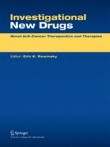
Summary
Background PF-06840003 is a highly selective indoleamine 2, 3-dioxygenase (IDO1) inhibitor with antitumor effects in preclinical models. This first-in-human phase 1 study evaluated safety, pharmacokinetics/pharmacodynamics, and preliminary efficacy in recurrent malignant glioma to determine the maximum tolerated dose (MTD) or recommended phase 2 dose (RP2D). Methods Patients (N = 17) received oral PF-06840003 in four dose-escalation groups: 125 mg once-daily (QD; n = 2); 250 mg QD (n = 4); 250 mg twice-daily (BID; n = 3); 500 mg BID (n = 8). A modified toxicity probability interval method determined the MTD. Results Four patients experienced serious adverse events (SAEs); one with treatment-related SAEs (grade 4 alanine and aspartate aminotransferase elevations). The dose-limiting toxicity (DLT) rate at 500 mg BID was 12.5% (n = 1/8); the MTD was not reached . Following PF-06840003 dosing, median time to maximum plasma concentration for the active enantiomer PF-06840002 was 1.5–3.0 hr and mean elimination half-life was 2 to 4 hr (Cycle 1 Day 1). Urinary recovery of PF-06840002 was low (< 1%). At 500 mg BID, maximum mean percentage inhibition of 13C10 kynurenine vs endogenous kynurenine was 75% vs 24%. PF-06840002 CSF-to-plasma ratio was 1.00. Disease control occurred in eight patients (47%). Mean duration of stable disease (SD) was 32.1 (12.1–72.3) weeks. Two patients with SD discontinued the study at 450 and 561 days and continued PF-06840003 on compassionate use. Conclusion PF‑06840003 up to 500 mg BID was generally well tolerated with evidence of a pharmacodynamic effect and durable clinical benefit in a subset of patients with recurrent malignant glioma. ClinicalTrials.gov, NCT02764151, registered April 2016.



Δεν υπάρχουν σχόλια:
Δημοσίευση σχολίου
Σημείωση: Μόνο ένα μέλος αυτού του ιστολογίου μπορεί να αναρτήσει σχόλιο.